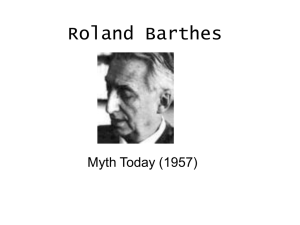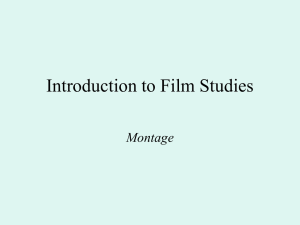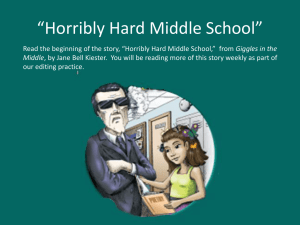Improving Editing Strategies
advertisement
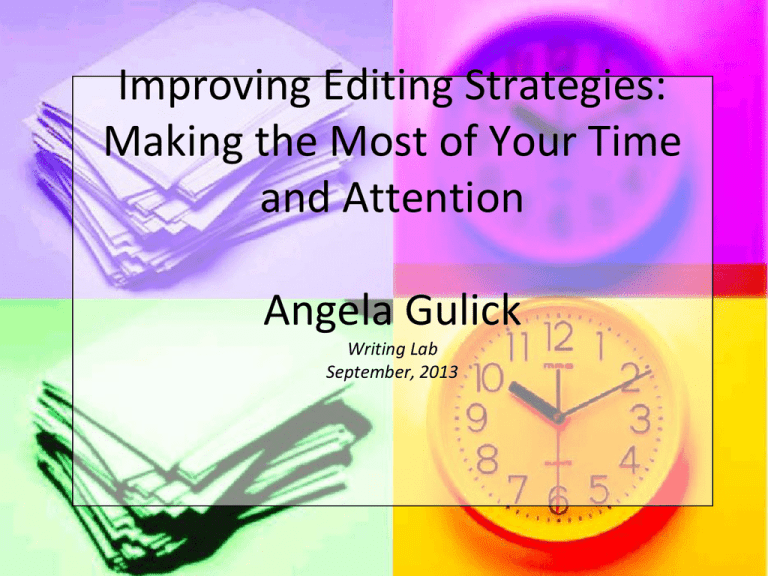
Improving Editing Strategies: Making the Most of Your Time and Attention Angela Gulick Writing Lab September, 2013 Introduction Today’s workshop has two main goals: identify the five most common editing myths discuss ways to maximize editing effectiveness April 8, 2015 2 Editing Myths Myth One: I should edit my work as I go, stopping frequently to make corrections. Rationale: I should edit my work early on, while I am creating the original document. I should stop writing as soon as I discover an error and correct it immediately. April 8, 2015 3 Myth One: I should edit my work as I go, stopping frequently to make corrections. This is a myth because creating the original document is a lot of hard work that demands your full attention. If you interrupt yourself every four words to correct a comma or a misspelled word, you will interrupt the creative process. It is better to edit your work after you have an original draft of something written. Professional writers let a lot of errors go by while they are generating their drafts; these writers know that “clean-up” comes later in the process. April 8, 2015 4 Myth Two: I should edit right after I finish writing my document. Rationale: I should edit my work the minute I finish writing, when my ideas are still “fresh” in my mind and I am in a writing zone/frame of mind. This way, I will most likely see my errors. April 8, 2015 5 Myth Two: I should edit right after I finish writing my document. Actually, one of the worst times to edit work is right after you wrote it. Your mind is probably somewhat fatigued, and your memory will often “see” what you meant to write, not what you actually wrote. It is best to edit your work with a fresh perspective, ideally the next day or after an hour or two. Of course, this takes careful planning and budgeting of time. April 8, 2015 6 Myth Three: The best way to edit is to read and re-read and re-reread and re-re-re-read and (aw, you get the idea) my document. Rationale: To edit successfully, I should read my paper over and over again, from beginning to end. If I do this enough times, the errors will eventually “pop” out at me, and I will see them. April 8, 2015 7 Myth Three: The best way to edit is to read and re-read and re-reread and re-re-re-read and (aw, you get the idea) my document. Reading a document over will certainly help you find some errors. However, unless you know what you’re looking for, you won’t find them all. The best strategy is to read your document once for basic coherence. Then, read your paper again, each time looking for a particular kind of error. In this way, use each reading as a sort of “search and destroy” mission. April 8, 2015 8 Myth Four: Spelling and grammar computer programs will catch all of my errors. Rationale: Computers are really sophisticated these days, so all I have to do is run a spell-check program and the grammar-check program, and they will find all of my problems. I should always believe what these programs suggest and click “yes” no matter what. April 8, 2015 9 Myth Four: Spelling and grammar computer programs will catch all of my errors. Computers really are sophisticated, but the English language is even more sophisticated. A spelling program doesn’t look at context; it merely looks at spelling. If a word is spelled correctly, it is “approved.” For example, such a program won’t distinguish among words like the following: April 8, 2015 10 Myth Four: Spelling and grammar computer programs will catch all of my errors. April 8, 2015 affect effect a fact they’re their there two to too aisle isle I’ll I eye your you’re yore you ewe it’s its whether weather 11 Myth Four: Spelling and grammar computer programs will catch all of my errors. April 8, 2015 Grammar software sometimes requires a great deal of knowledge to use. A writer should never click on the “yes” option without clearly understanding what is being suggested. Often, clicking “yes” will not only make the problem bigger, it will often make the writing incoherent! 12 Myth Five: I make so many errors in my writing, I will never find them all or learn this stuff. In almost 25 years of teaching, I have never met a writer who makes every possible error. Rather, writers make errors in patterns. Even accomplished writers make the same types of errors. The goal of a writer is to do the following: April 8, 2015 13 Myth Five: I make so many errors in my writing, I will never find them all or learn this stuff. 1. Identify the errors you are most commonly making (the Writing Lab can help!) 2. Keep track of these errors on an index card, in a notebook, on your cell phone, or anywhere else you can refer to. April 8, 2015 14 Myth Five: I make so many errors in my writing, I will never find them all or learn this stuff. 3. Read your work looking for a particular kind of error (common spelling mistakes, commas, sentence fragments – whatever your pattern). April 8, 2015 4. Focus on the most common error patterns first. You can’t learn everything at once. 15 Myth Five: I make so many errors in my writing, I will never find them all or learn this stuff. 5. If you don’t understand a pattern or how to fix it, use The Writing Lab. It is our job to help you identify and understand patterns of error. April 8, 2015 6. Remember that grammar and mechanics do count because when used well, they showcase your other writing talents and abilities. When not used well, they distract or confuse readers. 16 Ways to Maximize Editing Effectiveness Read your writing aloud, whether it is to yourself or to another person. Reading into a digital recorder or your cell phone is helpful as well. Many errors are discovered because they simply sound awkward as you are saying them or as you are listening back. Some writers suggest reading a text backwards, one sentence at a time, to really focus on sentence-level clarity and correctness. April 8, 2015 17 Ways to Maximize Editing Effectiveness Give yourself some time between writing and editing your work, even if it is only an hour. If you try to edit immediately after composing, your eye might “see” what your mind remembers or thinks should be present. It is better to get a fresh start. April 8, 2015 18 Ways to Maximize Editing Effectiveness Try to do a different activity in between writing your assignment and editing it. Again, the goal here is to “wipe your memory clean” of what you wrote so that you can look at your work with a fresh pair of eyes. Playing basketball, working on math problems, watching TV for 30 minutes can actually help you when you finally sit down to edit. April 8, 2015 19 Ways to Maximize Editing Effectiveness Train yourself to use word-processing software, especially software that has "spell check" or grammar check programs. However, don't rely on spelling or grammar programs to catch all of the errors. Spell check programs will allow any correctly spelled word to “go by,” even if its it’s knot not the write right word four for what ewe you knead need. Grammar programs often offer suggestions that simply aren’t correct in your particular situation. April 8, 2015 20 Ways to Maximize Editing Effectiveness Keep track of the kinds of errors you make. You might have problems with only a few errors, such as semicolon errors and confusing their/there/they’re. Keeping track of your errors helps you find them more easily. April 8, 2015 21 Ways to Maximize Editing Effectiveness Proofread a paper more than once, each time looking for a specific type of error, particularly those you tend to make. Read an entire paper looking just for spelling errors and obvious typos. Then read for sentence-level errors. Continue looking for one error at a time. April 8, 2015 22 Ways to Maximize Editing Effectiveness Use a “Find” program to help you search for punctuation or other potential errors. Many software programs come with a “Find” feature. You can type in something you often misuse, such as a colon, and the computer will find every example of that element in the document. The computer won’t correct the error, but it will point out where you are using that element, and you can double-check your work for correctness. April 8, 2015 23 Ways to Maximize Editing Effectiveness April 8, 2015 24 Ways to Maximize Editing Effectiveness Form study groups in your classes and regularly review each other’s work. Because you are completing the same assignments as others in these classes, you are in a good position to assist each other in revising and editing work. April 8, 2015 25 Ways to Maximize Editing Effectiveness Use “sticky” notes to mark spots in your writing handbook and/or dictionary. Learning how to use a writing handbook or dictionary is a skill critical to success. Save yourself some energy by highlighting those areas you return to. Little sticky notes and “flags” work well. April 8, 2015 26 Ways to Maximize Editing Effectiveness Use available technology to assist you. Bookmark online dictionaries or writing handbooks so you can access information quickly. Search for apps that assist with grammar, spelling, punctuation, and mechanics. April 8, 2015 27 Ways to Maximize Editing Effectiveness SAVE FOR APPS OR WEBSITES April 8, 2015 28 Ways to Maximize Editing Effectiveness Make use of the Writing Lab. The Writing Lab (D120) will help by teaching how to edit your own work. However, the Writing Lab will not edit work for you. April 8, 2015 29 Final Thoughts The best way to edit work is to know what you are looking for and to choose your battles: focus on those errors you are most frequently making. Let the Writing Lab in D120 help you with this and other writing needs. Good Luck! April 8, 2015 30
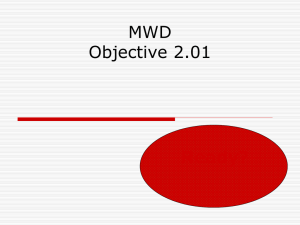
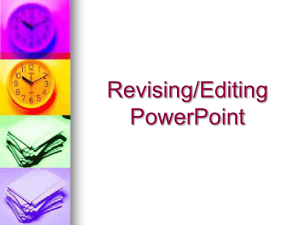
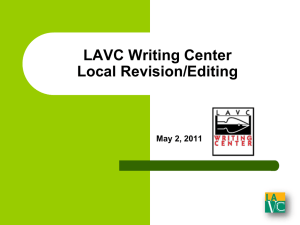
![[Lecture 11] french impressionism 2 wiki](http://s2.studylib.net/store/data/005312004_1-a91ff3d76aa998988e8364ab8758ea87-300x300.png)
